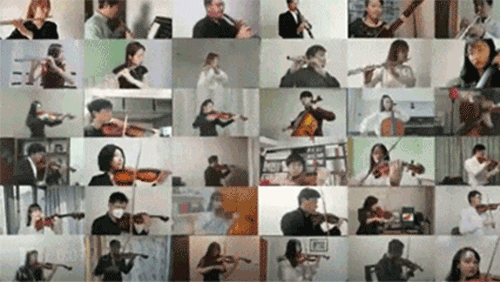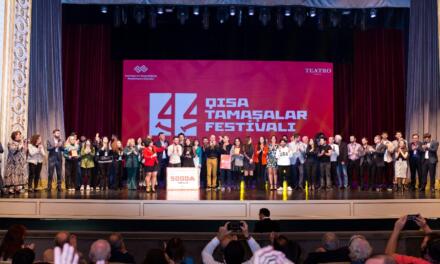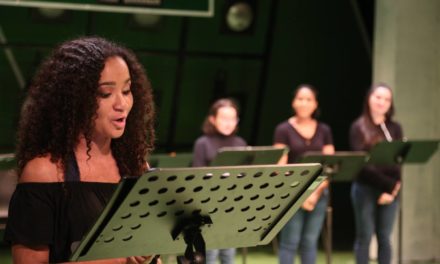As entertainment venues remain shut due to the COVID-19 epidemic, China’s live performance industry has moved online in hopes of garnering wider audiences virtually.
On Saturday, four popular Chinese performance groups — including Beijing’s Deyun Club, the country’s most renowned venue for “crosstalk” comedy — jointly launched a new livestreamed program for crosstalk performances, talk shows, and comedic drama on video platforms Xigua, Toutiao, and Douyin. Crosstalk is a traditional comedic art form rooted in Beijing that typically involves witty repartee between two performers.
Dubbed “Comedy Theater,” the new program will feature dozens of popular talk show hosts, comedians, and crosstalk performers, according to domestic media reports. On Saturday’s episode, crosstalk comedians Jin Fei and Chen Xi appeared in long, traditional gowns on a stage resembling that of an actual performance venue, while online audiences showered them with virtual gifts throughout the event.
“We are so pleased to meet everyone this way,” one of the comedians said, opening the virtual show. “We hope we can bring more happiness to you guys through this format.”
China’s live performance industry is one of many sectors that have been severely affected by the COVID-19 epidemic. According to the China Association of Performing Arts, nearly 8,000 performances in more than 20 provinces and cities scheduled for March were either canceled or postponed, with losses exceeding 1 billion yuan ($144 million). Other industry observers estimate that future losses could exceed 10 billion yuan.

A GIF shows members of an orchestra performing online. Xinhua.
Meanwhile, industry insiders have been coming up with solutions to mitigate the virus’ impact. Many theaters and orchestras, including the National Center for the Performing Arts and the Shanghai Symphony Orchestra, have started posting audio and video clips of past performances, freely accessible online. Many musicians stuck indoors have found new ways to connect with audiences through mediums such as “cloud clubbing,” while events like the annual Strawberry Music Festival are creating online spinoffs.
Although the free shows shared online do not translate to financial compensation, organizers consider the performances beneficial for boosting brands by helping them reach a wider audience.
“For the organizers, most of the videos online are classic and high-quality works, which will not affect ticket sales of the shows currently on tour, but can help build the brand,” a representative with leading theater management company Poly Theater told Beijing Evening News. “For those who weren’t in the habit of going to see performances in theaters but are interested in the performing arts, ‘cloud theater’ is a good fit for them, and this may attract new audiences to actually go see live performances in the future.”

Screenshots from an online “Crosstalk” performance. From @三言财经 on Weibo.
On China’s Quora-like Q&A platform Zhihu, many who watched “Comedy Theater” on Saturday said they enjoyed the free performances, while some also commented to say they weren’t as excited due to the lack of interaction between performers and viewers.
“Other than the movies and TV episodes available online, the opening of the ‘Comedy Theater’ provides more diverse choices to add to existing entertainment formats,” one Zhihu user wrote.
“Online comedy’s prospects aren’t not so optimistic,” commented another. “Those who often go to theaters to see performances know that the atmosphere of an offline performance often depends on the venue. Whether it’s crosstalk, drama, live music, concerts, or talk show performances, the immersive atmosphere is hard to recreate online.”
Zhu Kening, chairman of the China Association of Performing Arts, said in an interview with domestic media that although the epidemic has significantly impacted theaters, it has also encouraged innovation. Some formats such as crosstalk and talk shows can be adapted for an online audience, he said, but the virtual realm wouldn’t be ideal for operas or dance performances.
“Currently, online performances are supplementary to live performances, but not all shows are meant to move online,” Zhu said. “We should not be limited to just moving the art of theater online, but we should create art that’s suitable for online audiences.”
Editor: Bibek Bhandari.
This article was originally posted at sixthtone.com on March 11th 2020 and has been reposted with permission. To read the original article, click here.
This post was written by the author in their personal capacity.The opinions expressed in this article are the author’s own and do not reflect the view of The Theatre Times, their staff or collaborators.
This post was written by Cai Xuejiao.
The views expressed here belong to the author and do not necessarily reflect our views and opinions.


















